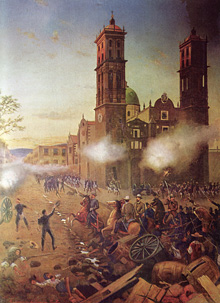
|
 |
 |
 Editorials | Opinions | May 2008 Editorials | Opinions | May 2008  
Cinco de Mayo: A Day for Pride, Not Partying
 Yolanda Chávez Leyva - Philly.com Yolanda Chávez Leyva - Philly.com
go to original

| 
Click image to enlarge | | Díaz at Puebla – This painting shows one of the critical moments of the Cinco de Mayo battle. The French assault has begun to break up under the deadly fire of Mexican marksmen from Fort Loreto and the fortified monastery of Guadalupe. Just then, General Porfirio Díaz appears, leading a detachment of Mexican cavalry in a charge against the dispirited French troops. | | |
I detest Cinco de Mayo and what it has become.

A few days ago, I saw my first Cinco de Mayo ad of the season - a beer bottle with "Cinco de Mayo" emblazoned across it.

Other ads urge us to celebrate the holiday by eating tacos and drinking margaritas. Processed food manufacturers advertise "Cinco de Mayo recipes." I even saw instructions for a "Cinco de Mayo sombrero cake"!

Cinco de Mayo has become one big party. And it angers me.

I don't have anything against having fun. But, as a historian, I am enraged at the ways corporations distort history in order to sell something - in this case, binge drinking, partying and food.

May 5 should be celebrated for what it truly represents rather than for what corporations want us to believe it stands for. It's not really "Mexico's Fourth of July" - Mexico celebrates its independence day on Sept. 16 - but it is the commemoration of a battle that demonstrated heroism and love of country.

On May 5, 1862, about 4,000 Mexicans confronted more than 6,000 well-trained and well-equipped French troops. The French, under Napoleon III, hoped to make Mexico part of their empire. Mexico, weakened by its loss of territory to the United States in the 1840s and attempting to stabilize itself, had suspended payment of foreign debts for two years. This gave France the justification for invading Mexico.

The Mexican troops, many of them indigenous and rural people from the Puebla region, armed primarily with antiquated weapons and machetes, won a battle against invading French troops. The victory was short-lived and the French eventually occupied Mexico, installing Maximilian as emperor of the country in 1864.

Yet, in defending their land, Mexico's poor people provided inspiration for generations to come.

Sadly, almost a century and a half later, we have all but forgotten the Zacapoaxtlan people and their courage and their sacrifices. Instead, big business has replaced those memories and erased history with promises of beer and nachos.

This year, let's stop celebrating in the way to which we have become accustomed. Let's put the beer bottle down, say no to wearing a sombrero and take history back.

Yolanda Chávez Leyva is an associate professor of history at the University of Texas at El Paso, specializing in Mexican American history. Contact: yleyva(at)utep.edu. | 
 | |
 |



